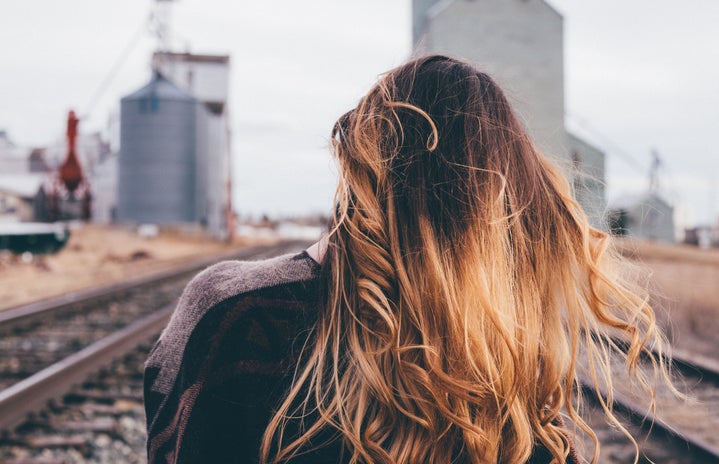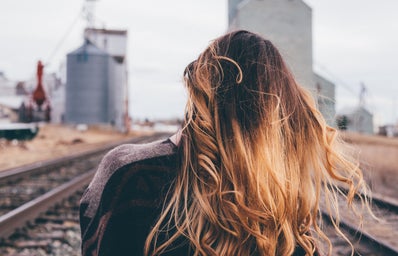It’s February, which means it’s Black History Month, which means for 28 days I’m actually prompted to think about my identity. Last year I wrote an article about my experience as a biracial person, and this year I have a more specific topic I’d like to address: hair.
Hair is a sensitive subject in the black community, or at least in my family. You can’t get a haircut without someone crying or telling you that you’re ruining your life (I wish I was joking). And aside from being a source of family drama, hair is the fluffy stuff on your head. There is definitely social significance to it, and you can’t avoid people judging you for it. In part it may represent your culture or your ethnicity, but in whole your hair, or lack thereof, should just be a reflection of you.
To get it out of the way, my hair is beautiful ─ especially when it’s in the stage between wet and dry and it frames my face perfectly and makes me look like a princess. But I didn’t always feel this way.
I got an anti-curl at age seven. For those who do not know what that is, it’s a chemical treatment to somewhat relax the curly texture of your hair. I don’t think I understood what it was at the time, but I was seven. I managed to forget all about it until my hair “randomly” got a lot curlier when I was in my mid-teens.
I started getting my hair flat-ironed when I was in third or fourth grade. I didn’t do it very often, and if anything it was just to get a break from dealing with the volume and all of my “curls.” The curls I spent years semi-regularly flat-ironing away were hardly so, at least compared to what I have now and especially compared to what my sister has always had. But still, I did it, and even though my hair would always get intolerably frizzy after a few days, I believed people when they told me it looked good.
(This is the obligatory part of the article where I acknowledge that my dad had always played India Arie and told me that I didn’t need to do anything to my hair, but what kid actually appreciates their parents’ wisdom before they reach adulthood?)
I stopped flat-ironing my hair when I got to high school and started running. This meant I needed to shower and thoroughly rinse my hair on a daily basis. A flat-iron was then out of the question, as the wet brings the curl back. (The process of that is really cool to watch as there’s a short period when I end up with my curls and waves but compressed and not super voluminous, which is the dream.)
In all of high school, I only flat-ironed my hair twice: for prom. The first time I only did the back because my curls held the updo much better than straight strands could ever hope to. The second time I did it all ─ and then jumped into a pool twelve hours later.
This is because at age seventeen I decided that I was over it. I even started to feel like it was a “betrayal” to wear my hair straight. I was very set that I should start wearing my hair natural to all important events because my curls were me and straight hair was not me. It was an intersection between my obsession with the idea of truth and the reality that is internalized racism.
Generations of conforming to Caucasian beauty standards doesn’t change overnight, and I never questioned it until I swung to the other side and faced the dichotomy to this ideology. When I married myself to the idea of my curls being equivalent to my identity, I thought I gave myself the authority to start judging others. I could judge myself for thinking my hair should be straight, and I could judge other black women who chose to wear their hair straight or wear a weave with straight hair.
I’d always been bothered by people who thought liking rock music or wanting to go camping or doing other “white” things meant that you hated black people. Thinking that I or someone else was racist for choosing to wear their hair straight was the same thing: stupid. No one makes a big fuss with when a white woman gets a perm, and while I know there is a lot of history and social context that makes this feel different, there still shouldn’t be fuss about it. Being proud of your natural hair and wearing your hair natural are not synonymous.
These days, I still struggle to not judge people ─ myself included ─ for how they wear their hair, but I try to give people the benefit of the doubt and hope that we’re all just expressing ourselves and doing what makes us happy. The lesson in this might be that I used to be and still am trying not to be a terrible person, but I think it’s really that we shouldn’t change ourselves to accommodate somebody else’s preferences of beauty. If you want to wear your hair straight because that’s what you prefer, then go for it. But if you’re just doing it because other people tell you that you look “nicer” or “more professional” that way, up theirs and do what you want.
So wear your hair straight, or wear it in curls. Or cut it all off if that’s what makes you feel like yourself, dear sister (I’ll always be here to intentionally do something crazier and make our family get more mad at me than you, because that’s what big sisters do). I don’t like how I look with flat-ironed hair for more than a few hours. But I still get annoyed with the volume of my hair, and that’s okay. As beautiful as I know my hair is and as much as other people like it, I still might relax it if I feel like it.
All images belong to the author. (Editor’s note: we love her.)



